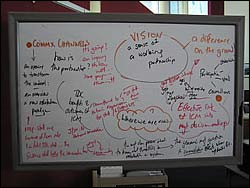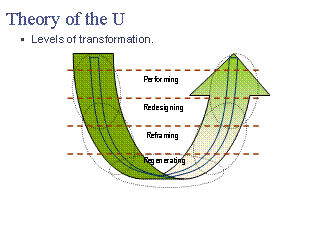Institutional Learning – Research and Practice
Research Status: Ongoing |
Whiteboard strategizing |
Introduction
The future is local (and global)
The Motueka ICM Programme has been a seedbed for learning about learning - in a multi-organisational setting. Our focus has been on enhancing the ability of people to think together and learn together about complex, systemic issues, at a local level.
We can anticipate that in the future, more and more integration between complex future choices will be made or mediated at a local level. We’ll be thinking at a local and catchment level in the future not just about water, land and biodiversity management - but nutrients and emissions trading, carbon capture, the impacts of fuel scarcity - and with that the reconfiguration of rural and urban land, issues of social wellbeing and social justice, resilience, and all aspects of well being. Global systemic issues are having a direct bearing on local thinking. The future capacity of communities to shape for their next generations will be founded in large part by their capacities to respond with wisdom to complex, systemic issues, at a local level.
The frustration is people (and the system)
The frustration of many programmes of action - national, regional or local - has not fundamentally been the shortfall in the science and certainty, but in how to enable people who come from many different points of view to find a clear shared purpose and to adhere to a plan of action together. To get to the source of that frustration, we have had to go “below the surface” of what seems to be going on, to seek the underlying systemic factors that cause us to become “accidental adversaries”.
Institutional learning is learning at the systemic level. It includes individual learning, and collective (social and organisational) learning. In our investigations, it has included two further key dimensions. One is complexity that arises in the interaction between multiple organisations. A separate but related dimension of institutional learning addresses those aspects of collective behaviour which are unintentional (unconscious) and which produce results that are unintended.
“Although un-individual, formal organizations, commonly identified as "institutions," may be deliberately and intentionally created by people, the development and functioning of institutions in society in general may be regarded as an instance of emergence; that is, institutions arise, develop and function in a pattern of social self-organization, which goes beyond the conscious intentions of the individual humans involved.”
The work of institutional learning, in short, is about what it takes to become conscious of our collective intentions, our ways of working and the consequences of our ways of working. We have been learning something of what it takes for a group of practical people to become a community of practice (Wenger, McDermott, and Snyder 2002), and for a community of practice to become a community of commitment (Kofman and Senge, 1999). And we have been able to work with and learn from local people as their world view shifted from seeing themselves as at the effect of their organisational and community setting, to being at the source of (or being a key ingredient of) creating the outcomes they want - what we have come to call active citizenship.
Although brought into focus by the emerging complexity of stewarding multiple issues across multiple sectors and levels, the roots of these frustrations are deeply human and ancient. And the answers are also indigenous to our humanity.
The answer is human
What our work points towards is the need for us to discover effective practices and ways of working together in the face of emerging complexity. Looking for the answer in software tools and knowledge systems can be a distraction. While useful, these tools can deal with explicit knowledge but do not access the tacit knowledge (Nonaka, 1994) that people across multi-sector groups and across the community hold, or activate the collective wisdom that is needed to shape the future.
The challenging work in the future is with the future - with what we do not yet know - and especially with the interconnections - the spaces in between: systems, knowledges, groups and perspectives. To deal with that, we need to grow a new, deep and wise capacity in our institutions and across our society.
The answer does not lie in any one of us but in all of us. “Together, we are a genius” (Lynn Twist).
Some learning and practice resources
Research Approach
Our research and practice journey
CommonGround has been the research and practice partner engaged with institutional learning in the Motueka ICM.
The Motueka ICM was the seedbed and practice field for this work, while the fruits have been applied in many other programmes around New Zealand including the development of nutrient trading instruments with multiple institutional partners in Lake Rotorua, and in the development of the New Zealand Emissions Trading Framework. The learning journey of the Institutional Learning work is unfolded in four stages:
- The first stage focussed within Tasman District Council, a New Zealand regional resource management agency. From this work, we developed principles and practical approaches on how to begin work on institutional learning. We developed a model of knowledge flow and transformation that included explicit and tacit dimensions and wisdom.
- In the second stage we explored the learning relationship between science and policy and in Tasman and in other institutional settings began to develop a set of reliable practice interventions to “unstick” collaborative working processes that were not working. We distinguished the “accidental adversary” systems archetype, thresholds of learning In a multi-sector setting, and explored “learning and unlearning”. We began to develop out theory of practice on how to build the conditions to allow a diverse group to bridge their learning thresholds.
- The third stage focused on design. How can we design institutional learning situations that grow the capacities of the participants and surface and serve a higher purpose? We piloted our design approach in a Rotorua study on the development of economic trading mechanisms for environmental management, deepened our practice and out theory of practice, and shared the design process with a number or national and regional programs.
- At the fourth stage, our attention has been on the question of how to take local pilots “to scale”. As we did so, we found ourselves working on our theory of change - how do we think we can change the world. We have been working with national and global learning partners who have a focus on local collaborations.
Research Results
Our research and practice outcomes
Our focus has been to make a tangible difference through practice; develop principles, practices and approaches that can be applied more widely, including a sound theoretical foundation; and develop local, national and global learning partnerships that grow all of us.
- We have focussed on the development and application of practical tools and approaches for working in complex local multi-sector settings. We have generated a series of design principles and approaches that can be applied by councils and cross-sectoral groups to significantly enhance learning in complex settings. These include structures, practices, resilient capabilities and stewardship.
- We also found ourselves developing an underpinning theoretical base. We have developed a theory of practice, including a model and distinctions of practice, to consciously steward institutional learning.
- We have developed a theory of knowledge based on our mapping of the knowledge domains in local collaborative practice which has allowed us to better understand the complementary roles of “hard science”, “local knowledge” and individual and collective wisdom.
- We have developed a theory of change. A theory of change identifies: What actions, with what people, in what setting, will produce what outcomes? Working with a theory of change has brought rigour to our work - what is it we are seeking to accomplish, and how do we imagine that could be brought about?
 |
Theory of the U - after Scharmer |
Recent Publications
Recent Presentations
Primary Contacts:

|
Glen Lauder
Email Phone: +64 21 513161 |
Institute CommonGround |
Expertise Organisational processes and learning, multi-stakeholder facilitation, science uptake |